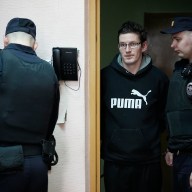 “Top Chef”‘s Tom Colicchio, executive producer of “A Place at the Table,” in theaters Friday
“Top Chef”‘s Tom Colicchio, executive producer of “A Place at the Table,” in theaters Friday
Credit: Magnolia Pictures
Tom Colicchio isn’t the only celebrity to lend his voice to an activist cause, but he is one of the most dedicated. The “Top Chef” star and restauranteur has long worked with charities and food programs, even testifying before Congress on improving childhood nutrition programs. Now he is executive producer of “A Place at the Table,” a documentary — co-directed by his wife, Lori Silverbush, and produced by Participant Media, of “An Inconvenient Truth” and “Lincoln” — on food insecurity, which plagues 50 million in the U.S.
You’ve said charities, while useful, aren’t enough.
Charities and organizations do great work. But the problem is, if we’re raising all this money, why does this problem keep growing? At a certain point you have to wonder if you need to lean on a bigger organization to make an impact — like the government. From doing research, we found a TV doc that CBS News did [“Hunger in America,” from 1968] that galvanized the population and very quickly got our government to create programs. The idea of a film changing things once before gave us the confidence that maybe a film could do it again.
“Table” deals with “food deserts,” urban and rural areas where healthy food is hard to find.
If you put a supermarket in a rural area, it actually acts as an anchor for other businesses to come into that area. There are programs in New York where they are giving money to bodega owners to put in refrigeration for fruits and vegetables. People will buy healthy food if it’s there.
Not only is hunger an issue, but so is obesity.
You’re going to find health insurance companies realizing they have a vested interest in getting kids to eat healthy foods, because they don’t want to pay for health care costs. Insurance companies lobby for seatbelt laws — I think they’ll lobby for healthy lunches. Because if you start eating healthy foods early on, you can avoid illnesses around obesity and hunger: diabetes, heart disease and various other ailments.
What do you say to people who decry outside assistance, saying government should be limited?
I feel there’s a stake with people who believe in limited government. If you look at health care costs, the numbers are $13 billion a year because of hunger and hunger-related issues. If you want limited government, doesn’t it make sense to keep people from being hungry? Food stamps have the lowest rate of fraud of any government program. It’s about 1 percent. These people aren’t gaming the system.
What can people do after seeing the film? After awareness, what’s the next step?
That’s the great thing about working with Participant [Media]: For them it was never just about making the film. It was about making a whole campaign around the film to help the problem. You can go to www.takepart.com/
table, which will bring you to a social action site with tons of information on how you can engage
















